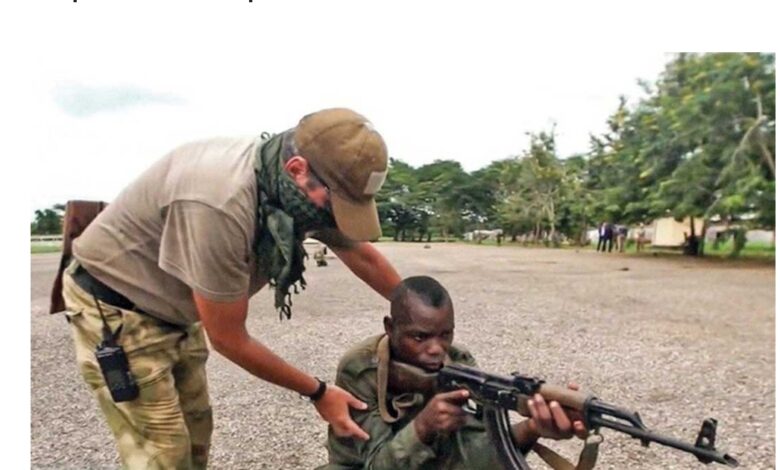Wagner Forces Arrive CAR Despite Uncertainty Over Their Future
This deployment of the Wagner Forces was reportedly announced by the Officers Union for International Security (COSI), a group linked to the Russian paramilitary group after other fighters left CAR in June.

In a surprising development, hundreds of fighters affiliated with the Wagner paramilitary group have arrived in the Central African Republic (CAR) to purportedly enhance security measures ahead of the country’s upcoming constitutional referendum scheduled for July 30.
Following a brief rebellion in Russia in June led by the founder of the Wagner paramilitary group, Yevgeny Prigozhin, hundreds of fighters from the group had left the Central African Republic, raising concerns about the viability of Wagner’s military and economic operations there and in other nations.
This deployment of the Wagner Forces was reportedly announced by the Officer’s Union for International Security (COSI), a group linked to the Russian paramilitary organization.
COSI revealed that a recent aircraft carrying instructors landed in Bangui, the capital city of CAR, as part of an ongoing rotation of personnel.
The group stated that these “experienced professionals” from the Wagner company would be joining the existing team working in CAR, with Russian instructors continuing their assistance to the country’s armed forces and law enforcement agencies.
The objective, according to them, is to ensure security during the forthcoming referendum that could see the president seek another term in 2025.
The involvement of the group raises concerns and questions about their long-term intentions and influence within CAR.
Wagner has been engaging in various conflict zones, often operating as a private military contractor and reportedly having close ties to the Russian government.
Accompanying the announcement, COSI released a photograph showing approximately 30 individuals wearing military fatigues and masks, standing in formation on what appeared to be an airport runway.
“Another aircraft has arrived in Bangui with instructors to work in the Central African Republic. The scheduled rotation continues. Several hundred experienced professionals from the Wagner company are joining the team working in the CAR,” the COSI said.
“Russian instructors will continue to help soldiers from the Central African armed forces and CAR law enforcement agencies provide security, in anticipation of the constitutional referendum scheduled for July 30,” the statement added.
Notably, the United States has labeled COSI as a front company for the Wagner group operating within CAR, and its leader, Alexander Ivanov, has been under US sanctions since January.
The press release issued by COSI emphasized that their instructors have been training the Central African security forces for over five years. They claim that this training has significantly contributed to improving the overall security situation in the country.
Contrary to previous reports suggesting a withdrawal of Wagner mercenaries from CAR, the government vehemently denied such claims at the beginning of July.
The government had previously said that the fighters’ movement was part of a rotation of forces rather than a withdrawal.
However, the situation surrounding the private paramilitary company has been uncertain since its failed mutiny in Russia on June 23-24.
However, despite this internal turmoil, Wagner’s involvement in foreign interventions, including Syria and several African countries such as Sudan, CAR, and Mali, has not been publicly questioned.
As soon as the mutiny was resolved, the CAR government promptly affirmed that Wagner’s activities would continue.
CAR plunged into deeper chaos in 2013 when then-President Francois Bozize was overthrown by a rebellion, triggering renewed clashes between various armed factions, including Jihadists, that exert control over vast territories.
Amidst this turmoil, the current president, Faustin-Archange Touadera, assumed office in 2016 and secured his re-election in 2020.
Seeking a solution to the persistent rebel groups, President Touadera turned to Russia for assistance. In a bid to address the security challenges, he now embarks on a campaign trail for a constitutional referendum.
This referendum, if approved, would eliminate the existing two-term presidential limit, potentially allowing Touadera to run for a third term.
Russia’s involvement in the Central African Republic (CAR) dates back to 2018 when they initially dispatched security contractors to the nation.
Over time, their support has intensified, with over 1,500 fighters, including instructors and soldiers, actively participating alongside the country’s army.
Notably, some of these Russian soldiers form part of President Touadera’s personal security detail and are frequently seen accompanying him.
Summary not available.
Support Our Journalism
There are millions of ordinary people affected by conflict in Africa whose stories are missing in the mainstream media. HumAngle is determined to tell those challenging and under-reported stories, hoping that the people impacted by these conflicts will find the safety and security they deserve.
To ensure that we continue to provide public service coverage, we have a small favour to ask you. We want you to be part of our journalistic endeavour by contributing a token to us.
Your donation will further promote a robust, free, and independent media.
Donate HereStay Closer To The Stories That Matter




